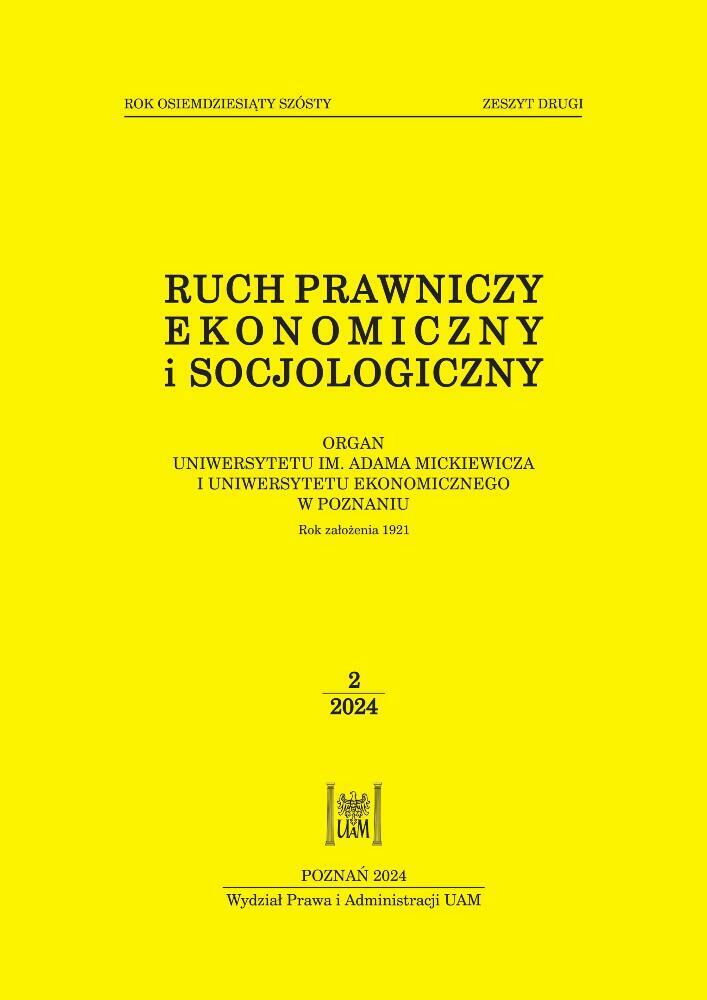Abstract
The study deals with the evaluation of the prosecutor’s action after the victim files a complaint against the decision to refuse to initiate or discontinue proceedings. As the current practice shows, here we meet a specific behaviour of a body, which, as a consequence, can lead to a significant violation of the procedural rights of the victim. The article provides a critical assessment of such action based on a thorough analysis of the regulations governing the functioning of the proceedings in this particular area. The filing of an appeal, in other words the submission of a procedural decision to appellate review, should petrify the evidentiary proceedings and exclude any procedural activity, without a prior decision to initiate proceedings as a result of the acceptance of the complaint. Otherwise, the meaning of judicial review is strongly undermined, and as a result, the right to a court is significantly restricted. The following discussion is intended to point out a problem that exists in practice and to draw attention to the negative consequences resulting from it. There is no doubt – as the analyses presented show – that the current situation must change.
Funding
National Science Centre (Poland) agreement no. 2018/29/B/HS5/00185
References
Czapliński, M. (2013). Podjęcie umorzonego postępowania przygotowawczego w wypadku złożenia zażalenia. Prokuratura i Prawo, 10, 88–100.
Gabriel-Węglowski, M. (2013). Regulamin prokuratury. Komentarz do §121–272 i 329–345 regulaminu wewnętrznego urzędowania powszechnych jednostek organizacyjnych prokuratury. Lex.
Gajowniczek-Pruszyńska, K. (2020). Komentarz do art. 55. W: K. Gajowniczek-Pruszyńska i P. Karlik (red.), Kodeks postępowania karnego. Komentarz do ustawy z 19.7.2019 r. Legalis.
Gruszecka, D. (2023). Komentarz do art. 168a. W: J. Skorupka (red.), Kodeks postępowania karnego. Komentarz (nb. 3). Legalis.
Grzegorczyk, P., i Weitz, K. (2016). Komentarz do art. 45. W: M. Safjan i L. Bosek (red.), Konstytucja RP: Tom 1. Komentarz do art. 1–86. C. H. Beck
Gutkowska, E. (1977). Problematyka ponownego wszczęcia umorzonego postępowania przygotowawczego. Problemy Praworządności, 7–8, 17–35.
Hofmański, P., i Wróbel, W. (2010). Komentarz do art. 13. W: L. Garlicki (red.), Konwencja o Ochronie Praw Człowieka i Podstawowych Wolności: Tom 1. Komentarz do artykułów 1–18. Legalis.
Kiejnich-Kruk, K. (2023). Prawo do skutecznego środka naprawczego w postępowaniu dowodowym. Wolters Kluwer.
Kułak, K. (2017). Postępowanie międzyinstancyjne w śledztwie i dochodzeniu. Prokuratura i Prawo, 7–8, 132–148.
Lach, A. (2022). Nadużycie uprawnień procesowych w postępowaniu karnym [w:] J. Kosonoga (red.) Przeciwdziałanie nadużyciu uprawnień procesowych w postępowaniach sądowych (s. 222–323). Dom Wydawniczy i Handlowy Elipsa.
Rydz-Sybilak, K. (2015). Zasada legalizmu w praktyce organów procesowych a uprawnienia pokrzywdzonego w postępowaniu przygotowawczym. W: B. Dudzik, J. Kosowski i I. Nowikowski (red.), Zasada legalizmu w procesie karnym (tom 1, s. 383–393). Wydawnictwo UMCS w Lublinie.
Skwarczyński, H. (2020), Komentarz do art. 327. W: D. Drajewicz (red.), Kodeks postępowania karnego. Komentarz (tom 1). Legalis.
Wiliński, P. (2011). Proces karny w świetle Konstytucji. Wolters Kluwer.
Wiliński, P. (2023). Nadużycie uprawnień przez prokuratora i sędziego w procesie karnym. Wolters Kluwer.
License
Copyright (c) 2024 WPiA UAM

This work is licensed under a Creative Commons Attribution 4.0 International License.





